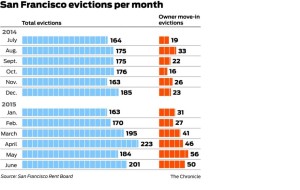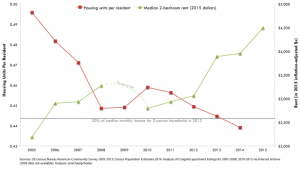The San Francisco Business Times reports that City Economist Ted Egan has concluded that the “Mission Moratorium” will cause a slight increase in housing costs across the City, with only a limited impact on the City’s ability to produce affordable housing. The Business Times notes that the moratorium nonetheless has the support of a majority of voters as the November ballot approaches.
Proposed Law To Affect SF Affordable Housing Priority
SocketSite reports on a proposed law that would alter the current priority in new affordable housing developments in the City. Currently, affordable housing preference operates on a lottery, which gives preference to, e.g., tenants who were recently evicted pursuant to the Ellis Act.
The new law would expand priority to tenants displaced by other non-fault evictions (as opposed to singling out the Ellis Act), and it would give priority in the neighborhoods from which the tenant was displaced.
Trulia Maps Where To Find Rent Control in San Francisco
Trulia compares rent control in New York and San Francisco, evaluating the differences in rent control/stabilization laws and tracking the neighborhoods where you’re most likely to find rent-controlled units. (No surprise: low percentages in SOMA and The Mission.)
SocketSite Picks on SF Gate for Sloppy Journalism (again)
In a City where reporting on the cost of housing apparently amounts to sensationalism, SocketSite seems to be serving the role of the fifth estate to the Chronicle’s SFGate.com. Last time, SocketSite took exception to SF Gate’s methodology for estimating the median rental rate in the City.
This time, SocketSite imposes a tamer view on SF Gate’s pick for “insane flip”:
“Someone gets an award for investment of the year at 1150 Sacramento St., #202. Property records show the unit, a 2-bed, 2-bath co-op on Nob Hill, sold for $690K in June of 2014. It was listed, went pending, fell out, was relisted and then sold for $1.740M in May 2015. No need to do the math: we’ve done it for you. That’s an appreciation of $1,050,000 in one year. Check out pictures in the gallery above.”
SocketSite interpreted public records to mean that this one year “appreciation” from the previous “purchase” likely followed a straw-man transfer between family members, and that the increase in value actually took place over a couple of decades.
Update: Sinbad’s Loses Lawsuit, Set To Close
SocketSite reports that Sinbad’s Restaurant on Pier 2 has lost its lawsuit, seeking judicial intervention in the City’s demand that it vacate to make way for demolition and the Port’s redevelopment plan.
Pro-Tenant Law Leads to Ironic Rise in “Evictions”
The San Francisco Chronicle is reporting on the ironic consequences of San Francisco’s recently debuted “Buy-Out Legislation“, which regulates the circumstances under which landlords can discuss “payment for possession” and bestows certain extra-contractual rights on tenants (like the right to rescind such an agreement for 45 days).
In March of 2015, San Francisco’s Ordinance 225-14 became effective. It prevents landlords from even discussing payments to tenants in exchange for their vacating a rent-controlled tenancy, unless the landlord first obtains a signed disclosure form (apprising tenants of their rights under the new legislation) and then files an affidavit with the Rent Board indicating compliance. (A challenge to the constitutionality of this regulation of commercial speech is currently underway.)
San Francisco certainly has an interest in regulating the landlord-tenant relationship. And, while only the pending constitutional challenge will determine if this particular regulation is lawful, the City is already seeing the effects at the Rent Board, which records data on fault-based and non-fault evictions.
While these regulations have a wide reach, the settlement of a pending unlawful detainer action is explicitly exempted from the definition of a “Buy-Out”. So, it should surprise no one that the number of fault-based evictions has increased in response, where a “notice to quit” can serve as an icebreaker, without putting these conversations under a magnifying glass.
The new law is having a similar effect on non-fault evictions. Generally, San Francisco makes it difficult to condo-convert. In an effort to discourage the conversion of rent-controlled rental housing stock to de-controlled condominiums, the City penalizes certain non-fault evictions designed to “clear out” rental units before the conversion. Where the Subdivision Code now imposes the same penalty on Buy-Outs, landlords no longer have a disincentive to simply invoke the owner move-in provision of the Rent Ordinance and recover possession with a non-fault eviction instead of paying the premium for possession without the dark mark on their use of the property afterward.
Zacks and Freedman’s Andrew Zacks told the Chronicle, “Before, when a landlord bought a tenant out, one of the things they were willing to pay for was confidentiality and privacy . . . A lot of my clients would prefer to negotiate, to sit down and work something out . . . But because of the legislation they just go ahead and file for eviction”.
With even Supervisor Scott Weiner’s reversal of support, the Buyout Legislation may be short-lived, whether overturned by the courts or undermined from within.
SFTravel and Airbnb Alliance
San Francisco Business Times reports on Airbnb formalizing a tourism partnership with SFTravel – the San Francisco Travel Association. Airbnb aims to enhance its users’ ability to “experience San Francisco like a local”, directing visitors to more conventionally residential neighborhoods and arming local merchants in those neighborhoods with “tourism tool kits”.
The Business Times contrasts Airbnb’s normalized relationship with the tourism trade association with the uncertainty of hosting platform regulations this November, noting a recent Re/code article reporting Airbnb’s estimate that San Francisco will lose $58 million in tax revenue over the next decade if the ballot measure is successful in slightly reducing the number of allowable hosted days per year.
Curbed SF Charts San Francisco “Housing Drought”
Curbed SF charts the San Francisco “housing drought”, showing median price as a function of housing per resident, intimating that policies like the Mission Moratorium may not alleviate the tension.
First District Court of Appeals Highly Committed to Mosser Companies Opinion in T & A Drolapas & Sons, L.P. v. CCSF (Borjas)
While there are relatively few appellate decisions interpreting Costa-Hawkins and its application to local rent-control ordinances, this year has already seen a pair of cases that add a lot of specificity to rent increases on the children of rent-controlled original occupants who move away.
Recently, in Mosser Companies v. CCSF, Division Three of the First Appellate District held that the son of the original lessees on the lease was an “original occupant”, having moved in at the commencement of the tenancy with the consent of the landlord, even though he was not a party to the lease. Accordingly, when the parents moved out, and the son stayed behind, the court found that the decontrol provisions of Costa-Hawkins would not allow the establishment of a new rental rate while an “original occupant” was still in possession. In Drolapas v. CCSF, Division Four acknowledged and agreed with their colleagues’ Mosser opinion.
KALW’s “It’s Your Call” on the Effect of the New “Tech Bubble” and the Sharing Economy on San Francisco Housing
David Talbot and Jason Benlevi sit down with Rose Aguilar on KALW’s “It’s Your Call” to discuss the impact of sharing economy “disruption” and the tech boom in general on San Francisco’s housing market.







